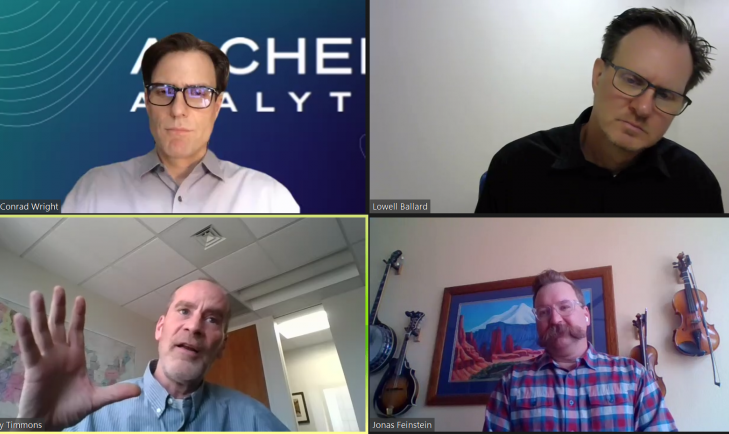04/19/22
Watch ‘Planning and Collaboration Tools,’ a new webinar exploring tools to help communities plan wildfire mitigation projects

The Western Governors’ Association hosted the webinar, Planning and Collaboration Tools, on April 19, 2022. The webinar examined technical platforms to help communities make informed decisions on mitigation and restoration priorities in pre-and post-wildfire scenarios.
Lowell Ballard, the Director of Geospatial Solutions at the Timmons Group, discussed how his company uses the Shared Wildlife Risk Mitigation (SWARM) tool to help coordinate forest management projects across multiple agencies and landowners and write grants for federal funding. “Western Governors need to promote tools like this that help locals help themselves,” he said. “The reality is that a lot of people living with wildfire are not in New Orleans where they have 9,000 people working for the country government and 10 grant writers.”
 Conrad Wright, the President and Founder of Alchemy Analytics, demonstrated his company’s use of geospatial data and Lidar to provide communities with detailed information about the health of specific tree stands and their risk of ignition. “Information services serve multiple phases across the life cycle of a fire,” he said. “We extract [geospatial] information, then dive into the statistical patterns that emerge with the goal of trying to prioritize our various Wildland Urban Interfaces, potential fuel breaks and, or mitigation projects so that teams can have a little bit more substantiation behind their decisions and what needs to happen next.”
Conrad Wright, the President and Founder of Alchemy Analytics, demonstrated his company’s use of geospatial data and Lidar to provide communities with detailed information about the health of specific tree stands and their risk of ignition. “Information services serve multiple phases across the life cycle of a fire,” he said. “We extract [geospatial] information, then dive into the statistical patterns that emerge with the goal of trying to prioritize our various Wildland Urban Interfaces, potential fuel breaks and, or mitigation projects so that teams can have a little bit more substantiation behind their decisions and what needs to happen next.”
Jonas Feinstein, the West Regional Conservation Forester at the USDA Natural Resources Conservation Service, explained the use of the Area Wide Planning tool, which is built to help communities take all of the information made available using new tools like SWARM and develop a concrete plan to ensure the most efficient, environmentally friendly plan for mitigation work. “Having better planning tools and a collaborative governing process that works, is going to change the paradigm from counting acres to making acres count, and it’s a really important distinction,” he said.
Planning and Collaboration Tools was the first webinar in a four-part series for Idaho Gov. Brad Little’s WGA Chair Initiative, Working Lands, Working Communities, which is examining the interdependent relationship between western communities and natural resource management entitles, as well as the role that local communities play in successful land planning and management processes.
Find more information on the next webinars in the series and register here.